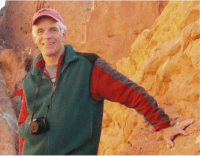Estimation of T and K from Specific Capacity Tests Using TGUESS:
AQUIFER TESTING ONLINE COURSE, MODULE 4
Discover and learn the most up-to-date information
about aquifer pumping test techniques from some of the most
recognized authorities in ground water.
Pre-Course Tutorial and Study Materials:
Registrants dive into the course experience with study materials and a self-assessment. The personalized experience allows each registrant to learn (1) at their own experience level, (2) at their own pace, and (3) and in a private setting except when they have questions or request extra tutorials.
Prelude to Module 4:
Registrants can prepare for Module 4 by reading the study notes before the live event and preparing questions for the instructor Ken Bradbury. Module 4 covers specific capacity tests, sources and management of large data sets, and the step-wise procedures for using TGUESS.
Specific Capacity tests (also called well completion tests) refer to short-term pumping tests usually performed by well drillers. They are conducted routinely to measure trends in sustainable yield for both private and public wells.
Specific Capacity tests are also applied to refine pumping test design and can be used for estimating both transmissivity (T) and hydraulic conductivity (K) of the screened formation.
These tests are single-well tests because drawdown is measured in the borehole itself, and often only two measurements are reported: a static (or non pumping) level and a water level after a period of pumping (typically several hours).
Results are usually reported as specific capacity, defined as pumping rate divided by drawdown, or Q/s. A common reporting unit is gallons per minute per foot of drawdown, or GPM/ft.
|
![]()
Photo by Sara Stathas for the University of Wisconsin Water Resources Institute |
Although the concept of Specific Capacity tests is simple,
they require attention to detail and careful analysis of the results.
TGUESS is a free application authored by Ken Bradbury. This course module provides strategies for reliable Specific Capacity Testing coupled with examples of analysis using TGUESS. A free copy of an MS Excel Spreadsheet that formulates TGUESS is included in this course.
![]()
Register now for this unique online-offline course
that presents key insights about aquifer pumping tests
that are found no where else online.
What is TGUESS?
- A simple program to estimate aquifer transmissivity and hydraulic conductivity from specific-capacity data reported by well drillers
- Based on an iterative solution of the Theis equation
- Corrects for partial penetration and well loss
- Runs in Excel, or can be implemented in other ways
- Takes advantage of abundant water-well data
- Quick and easy, but not a substitute for a true pumping test
What this course covers:
- Specific capacity tests, and how such tests are reported on well construction reports
- Theory and history of TGUESS
- Advantages and pitfalls of TGUESS
- Using TGUESS in a spreadsheet or database
- How to spot erroneous or spurious data
- Statistical analyses of TGUESS results
- Using TGUESS to help characterize regional aquifers
Whether you want to apply aquifer pumping tests to hydrogeologic characterization, water supply development or remediation design, this module will provide attendees with information that is not available elsewhere on the web.
Instructor Bio
Ken Bradbury, PhD, PG
 Dr. Kenneth Bradbury is Wisconsin's State Geologist and Director of the Wisconsin Geological and Natural History Survey, UW-Madison Division of Extension. Ken is a hydrogeologist who has worked and published on groundwater issues in Wisconsin since 1982, with a focus on applied problems. His research has included investigations of virus transport in groundwater, groundwater flow in fractured rocks, aquitard hydrogeology, groundwater recharge processes, wellhead protection, regional groundwater simulation, and the hydrogeology of glacial deposits.
Dr. Kenneth Bradbury is Wisconsin's State Geologist and Director of the Wisconsin Geological and Natural History Survey, UW-Madison Division of Extension. Ken is a hydrogeologist who has worked and published on groundwater issues in Wisconsin since 1982, with a focus on applied problems. His research has included investigations of virus transport in groundwater, groundwater flow in fractured rocks, aquitard hydrogeology, groundwater recharge processes, wellhead protection, regional groundwater simulation, and the hydrogeology of glacial deposits.
He received his B.A. from Ohio Wesleyan University, where he majored in geology, then earned a Master's degree from Indiana University. He received his PhD from the UW-Madison Department of Geology in 1982.
Ken is an affiliate faculty member in the UW-Madison Department of Geoscience and the Nelson Institute at UW-Madison. He is a Fellow in the Geological Society of America and is active in the Association of American State Geologists. Ken has served on the Water Science and Technology Board of the National Academy of Sciences and on committees advising the US Geological Survey.